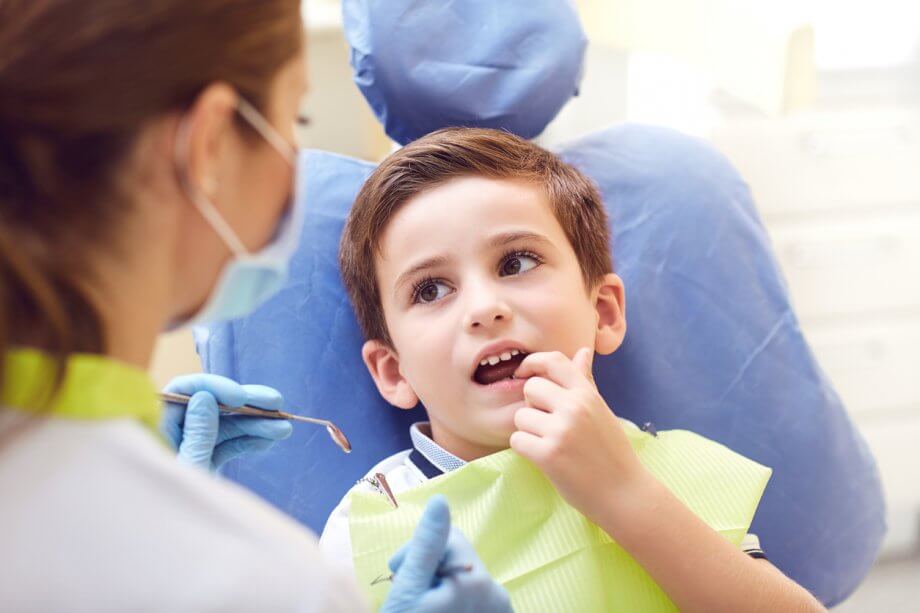According to the CDC, tooth decay is considered the most common chronic disease that American children experience; however, with regularly scheduled, biannual dental cleanings and exams, a daily dental hygiene routine as well as dental sealant use, the likelihood of tooth decay decreases. During your child’s dental exam, Dr. MaryJo McGuire will check for signs of gum disease, tooth decay, and any other issues that could affect your child’s dental health.
What Causes Cavities?
Tooth decay is caused by the bacteria that reside in the mouth. These bacteria eat the sugar and starches (carbohydrates) that remain in the mouth after a meal or snack. Foods high in carbohydrates include cereals, breads, soda, milk, candy, cake and fruit.
As the bacteria eat, they create a sticky, thin film. This film clings to the teeth (plaque). This film contains acids that break down and dissolve the enamel, which is the protective coating on the surface of the teeth. Once the enamel is compromised, cavities develop.
Preventing Cavities: Babies and Toddlers
Despite what many people think, the primary teeth are very important because they serve as a guide for the permanent teeth to erupt into the mouth. For this reason, caring for them properly as soon as they erupt is recommended.
The American Academy of Pediatric Dentistry (AAPD) recommends that parents take their children to the dentist before their first birthday. Ideally, once the first tooth erupts, which usually occurs around six months of age, you should schedule an appointment with a pediatric dentist. Remember to keep his or her tooth/teeth free of plaque, clean it with a wet washcloth after every feeding.
Avoid Sippy Cups and Bottles at Bedtime — Even Before any Teeth Erupt
Avoid giving your child a sippy cup or bottle to soothe him/her to sleep: This practice allows the juice and formula to drip directly onto the baby’s teeth and gums. This prolonged contact provides bacteria the perfect place to breed.
Sips of Water After Eating and Drinking
Whenever your child eats or drinks a beverage (other than water), have him or her take a few sips of plain water. This helps wash away any debris remaining in the mouth.
Vitamin-Rich Foods and Meals
Finger foods and meals for your toddler should be rich in vitamins D as well as other nutrients known to support dental health. Try to avoid sugary and processed treats. In addition, limit legumes and grains because these contain phytic acid, which can lead to tooth decay.
Teach Proper Brushing Early On
Start good dental hygiene habits early by teaching your toddler how to brush properly. The toothbrush you purchase needs to be designed specifically for children. Also, make sure the toothpaste you choose is safe for toddlers.
Biannual Dental Visits
While wiping your infant’s teeth and helping your toddler learn how to properly brush and floss is essential for your children's dental health, it is inevitable that some plaque will harden into tartar. Once tartar develops, only a dental professional can remove it.
Preventing Tooth Decay in Children and Teens
Once your child reaches the age of nine, many of his or her adult teeth are present; therefore, an adult, soft-bristled toothbrush and a toothpaste that contains fluoride can be used. Brushing should be performed for at least two minutes each session, twice a day (e.g., morning and night).
Proper Brushing Technique
The proper brushing technique does not involve a seesaw motion, but instead involves a circular motion of the toothbrush around the teeth and near the gums. Flossing once a day is recommended.
Rinse After Eating
Encourage your children to rinse their mouths after each meal, snack and after they drink anything other than water. Rinsing will help remove some of the debris and sugar that the bacteria feed on.
Brushing After a Meal: Wait 30 Minutes
This waiting period is essential after eating because the tooth enamel may be susceptible to erosion if your child ate processed or highly acidic foods.
Ask About Dental Sealants
Dental sealants are used to keep food particles from getting caught in the teeth. These sealants are ‘painted into’ the crevasses of the chewing surfaces of the permanent molars as they erupt into the mouth.
No matter what your child's age, biannual cleanings and checkups are essential to preventing cavities. In addition, with these checkups, any other dental issues can be caught early on.
If your child needs a cleaning and exam, contact Dr. MaryJo McGuire’s office today at 908-735-6300 to schedule an appointment. As a pediatric dentist, Dr. McGuire specializes in providing dental care to children from infancy, through the teen years, and into young adulthood. Our office is located at 1465 Route 31 South, Annandale, New Jersey.
